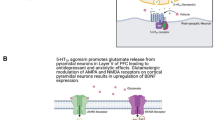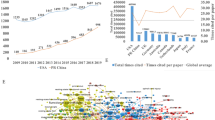Abstract
The provocative articles in this Special Issue underscore the potential of cognitive neuroscience to achieve fruitful integration across diverging levels of analysis. After a discussion of different forms of reductionism and the pragmatic, ideological, and cognitive obstacles standing in the way of achieving integrative explanatory pluralism, I outline five challenges to applying cognitive neuroscience to the study of depression and allied conditions: (1) comorbidity, (2) etiological heterogeneity, (3) ambiguity concerning causal primacy, (4) distinguishing state from trait markers, and (5) distinguishing specific from nonspecific treatment effects. Greater attention to these challenges should assist in bringing about consilience in the conceptualization of depression.
Similar content being viewed by others
References
Akiskal, H. S., & McKinney W. T. (1973). Depressive disorders: Toward a unified hypothesis. Science, 182, 20–29.
Black, D. (2000). On the origin of morality. In L. D. Katz (Ed.), Evolutionary origins of morality: Cross-disciplinary perspectives (pp. 107–119). Bowling Green, OH: Imprint Academic.
Cacioppo, J. T., Berntson, G. G., Sheridan, J. F., & McClintock, M. K. (2000). Multi-level integrative analyses of human behavior: Social neuroscience and the complementing nature of social and biological approaches. Psychological Bulletin, 126, 829–843.
Caspi, A., Sugden, K., Moffitt, T. E., Taylor, A., Craig, I. W., Harrington. H., et al. (2003). Influence of life stress on depression: moderation by a polymorphism in the 5-HTT gene. Science, 301, 386–389.
Chambless, D. L., & Ollendick, T. H. (2001). Empirically supported psychological interventions: Controversies and evidence. Annual Review of Psychology, 52, 685–716.
Comte, A. (1830–1842). Cours de Philosophie positive, selections translated by Margaret Clarke as The Essential Comte. New York: Barnes and Noble.
Cosmides, L., Tooby, J., & Barkow, J. (1992). Introduction: Evolutionary psychology and conceptual integration. In J. Barkow, L. Cosmides, & J. Tooby (Eds.), The adapted mind: Evolutionary psychology and the generation of culture (pp. 3–15). New York: Oxford University Press.
Cronbach, L. J. (1957). The two disciplines of scientific psychology. American Psychologist, 12, 671–684.
De Jong, H. L. (2002). Levels of explanation in biological psychology. Philosophical Psychology, 15, 441–462.
Dennett, D. C. (1995). Darwin’s dangerous idea. New York: Simon and Schuster.
Fiske, S. T., & Taylor, S. E. (1991). Social cognition. (2nd ed.). New York: McGraw Hill.
Gazzaniga, M. S. (1998). The Mind’s past. Berkeley, CA: University of California Press.
Gottesman, I. I., & Shields, J. (1972). Schizophrenia and genetics: A twin study vantage point. New York: Academic.
Heller, W. (1993). Neuropsychological mechanisms of individual differences in emotion, personality, and arousal. Neuropsychology, 7, 476–489.
Henriques, G. (2004). Psychology defined. Journal of Clinical Psychology, 60, 1207–1221.
Iacono, W. G. (1983). Psychophysiology and genetics: A key to psychopathology research. Psychophysiology, 20, 371–383.
Ilardi, S. S., & Feldman, D. (2001). The cognitive neuroscience paradigm: A unifying meta-theoretical framework for the science and practice of clinical psychology. Journal of Clinical Psychology, 57, 1067–1088.
Ilardi, S. S., Rand, K., & Karwoski, L. (2007). The cognitive neuroscience perspective allows us to understand abnormal behavior at multiple levels of complexity. In S. O. Lilienfeld & W. T. O’Donohue (Eds.), The great ideas of clinical science: 17 principles that every mental health professional should understand (pp. 291–309). New York: Routledge.
Keil, F. C. (2006). Explanation and understanding. Annual Review of Psychology, 57, 227–254.
Kendler, K. S. (2005). Toward a philosophical structure for psychiatry. American Journal of Psychiatry, 162, 433–440.
Laudan, L. (1977). Progress and Its problems. Berkeley, CA: University of California Press.
Lewinsohn, P. M. (1974). Clinical and theoretical aspects of depression. In K. S. Calhoun, H. E. Adams, & K. M. Mitchell (Eds.), Innovative treatment methods in psychopathology (pp. 63–120). New York: Wiley.
Lilienfeld, S. O., Waldman, I. D., & Israel, A. C. (1994). A critical examination of the term and concept of ‘comorbidity’ in psychopathology research. Clinical Psychology: Science and Practice, 1, 71–83.
Lilienfeld, S. O., & Waller, N. G. (2005). A great pioneer of clinical science remembered: Introduction to the Special Issue in honor of Paul E. Meehl. Journal of Clinical Psychology, 61, 1201–1207.
Maser, J. D., & Cloninger, C. R. (1990) (Eds.) Comorbidity of mood and anxiety disorders. Washington, DC: The American Psychiatric Press.
Miller, G. A. (1996). How we think about cognition, emotion, and biology in psychopathology. Psychophysiology, 33, 615–628.
Mitchell, S. D., Datson, L., Gigerenzer, G., Sesardic, N., & Sloep, P. (1997). The why’s and how’s of interdisciplinarity. In S. Maasen, S. D. Mitchell., P. J. Richerson, & P. Weingart (Eds.), Human by nature: Between biology and the social sciences (pp. 103–150). Hillsdale, NJ.: Erlbaum.
Robinson, D. N. (1995). The logic of reductionist models. New Ideas in Psychology, 13, 1–8.
Schaffner, K. F. (1994). Psychiatry and molecular biology: Reductionistic approaches to schizophrenia. In J. Z. Sadler, O. P. Wiggins, & M. Schwartz (Eds.), Philosophical perspectives on psychiatric diagnostic classification (pp. 279–294). Baltimore, MD: Johns Hopkins University Press.
Shadish, W. R., Cook, T. D., & Campbell, D. T. (2002). Experimental and quasi-experimental designs for generalized causal inference. Boston: Houghton-Mifflin.
Staats, A. W. (1991). Unified positivism and unification psychology. American Psychologist, 46, 899–912.
Sternberg, R. J. (2006, Spring). Is there still any hope of a unified Psychology?. The General Psychologist, 41(1), 15–16.
Tversky, A., & Kahneman, D. (1974). Judgment under uncertainty: Heuristics and biases. Science, 185, 1124–1131.
Wachtel, P. L. (1980). Investigation and its discontents: Some constraints on progress in psychological research. American Psychologist, 35, 399–408.
Walsh, A. (1997). Methodological individualism and vertical integration in the social sciences. Behavior and Philosophy, 25, 121–136.
Watson, D., & Clark, L. A. (1984). Negative affectivity: The disposition to experience unpleasant emotional states. Psychological Bulletin, 95, 465–490.
Wilson, E. O. (1998). Consilience: The unity of knowledge. New York: Vintage Books.
Wittgenstein, L. (1953). Philosophical investigations. Translated by G.E.M. Anscombe. New York: The MacMillan Company.
Author information
Authors and Affiliations
Corresponding author
Rights and permissions
About this article
Cite this article
Lilienfeld, S.O. Cognitive Neuroscience and Depression: Legitimate Versus Illegitimate Reductionism and Five Challenges. Cogn Ther Res 31, 263–272 (2007). https://doi.org/10.1007/s10608-007-9127-0
Published:
Issue Date:
DOI: https://doi.org/10.1007/s10608-007-9127-0




